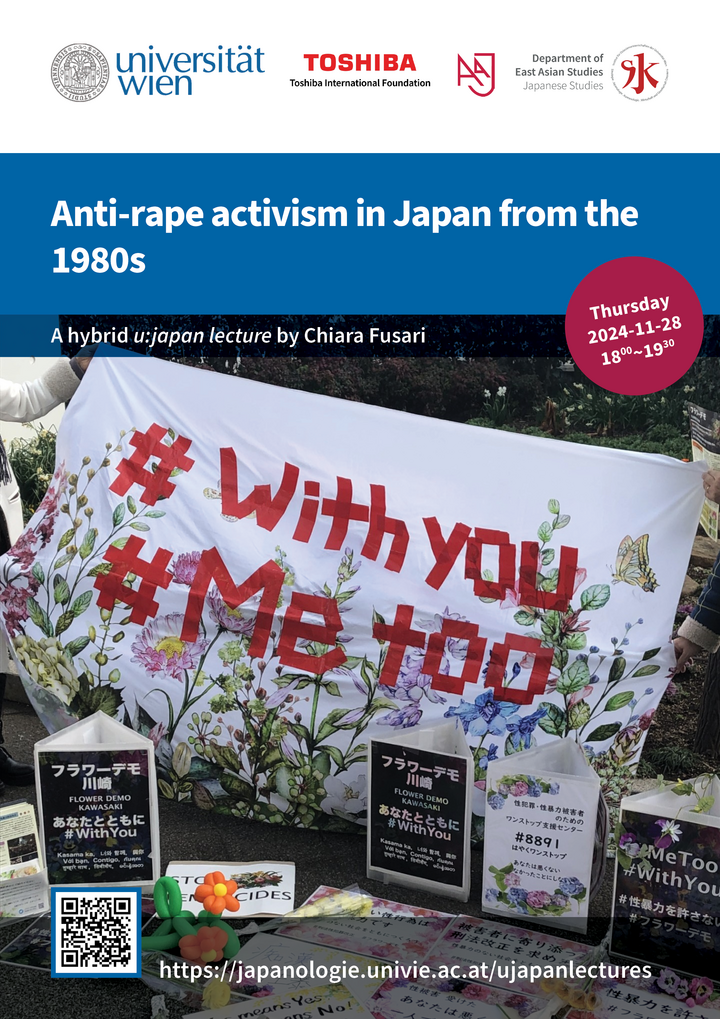Donnerstag, 28. November 2024, 18:00 - 19:30 iCal
u:japan lecture | s09e06 | Chiara Fusari
Anti-rape activism in Japan from the 1980s
Seminarraum JAP 1, 2K-EG-21, Ground floor to the left
Spitalgasse 2, Hof 2.4 (Campus), 1090 Vienna
Hybrider Event (an einem physischen Ort und online)
| Abstract |
Since the late 2010s, sexual violence has increasingly gotten attention in Japan becoming a topic of discussion in media, politics, and society. In 2017, Ito Shiori went public accusing a senior journalist of raping her and in the same year the Penal Code’s articles on sex crimes were reformed for the first time in 110 years. In 2019 a series of non-guilty verdicts for rape cases sparked public outrage which was channelled by feminist activists into the Flower Demo movement. In 2023 the Penal Code was reformed once again and the BBC released a documentary exposing the sexual abuse of young boys perpetrated, since the 1970s, by Johnny Kitagawa, founder of one of the most famous talent agencies in Japan.
However, sexual violence is neither a new problem in Japan nor a new issue discussed by feminists. While it certainly has been, and still is to a degree, a taboo topic in Japanese society, women’s groups in Japan have been tackling the problem since the early 1980s. They established the first support services for victims filling in an institutional void, they spoke out about rape myths and deep-rooted sexism, and they engaged in social actions to raise awareness about the issue. This lecture will explore an often-forgot page of Japanese feminism retracing the history of anti-rape activism in Japan: the first grassroots women’s groups in the 1980s and 1990s, the first advocacy efforts for legal reforms in the 2010s, the emergence of the #MeToo movement and the Flower Demo in recent years, and the two reforms of the Penal Code.
| Bio |
Chiara Fusari is currently pursuing her PhD and serves as a teaching assistant at the Institute of Asian and Oriental Studies at the University of Zurich. She earned her Master’s degree at Leiden University, where she conducted research on the involvement of buraku women in the Buraku liberation movement. Recently, part of her findings was published as a peer-reviewed article titled “Buraku Women: Literacy as a Path to Empowerment.” Her research focuses on gender, minority issues and social movements in Japan. For her doctoral dissertation, she is investigating anti-sexual violence activism in Japan, conducting in-depth interviews with advocates and participant observation.
| Date & Time |
u:japan lecture | s09e06
Thursday 2024-12-28, 18:00~19:30
| Place & Preparations |
LIVE @ Campus of the University of Vienna
Department of East Asian Studies, Japanese Studies
Seminarraum JAP 1, 2K-EG-21, Ground floor to the left
Spitalgasse 2, Hof 2.4 (Campus), 1090 Vienna, Austria
| Plattform & Link |
univienna.zoom.us/j/69287997146
Meeting ID: 692 8799 7146 | Passcode: 053651
| Further Questions? |
Please contact ujapanlectures.ostasien@univie.ac.at or visit japanologie.univie.ac.at/ujapanlectures/s09/.
Veranstalter
Institut für Ostasienwissenschaften/Japanologie und AAJ (Akademischer Arbeitskreis Japan)
Kontakt
u:japan lectures
Department of East Asian Studies
Japanese Studies
01427743814
ujapanlectures.ostasien@univie.ac.at
Erstellt am Mittwoch, 30. Oktober 2024, 15:36
Letzte Änderung am Donnerstag, 31. Oktober 2024, 11:56

